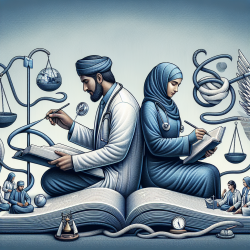How This Groundbreaking Physics Research Can Transform Your Therapy Skills!

The ATLAS experiment at the Large Hadron Collider (LHC) has provided fascinating insights into the reconstruction of primary vertices in proton–proton collisions. This research can offer valuable lessons for professionals in online therapy services, particularly in the realm of special education. By understanding and applying the methodologies used in this groundbreaking physics research, practitioners can enhance their skills and deliver more effective therapy sessions.
Key Insights from the ATLAS Experiment
The ATLAS experiment focuses on reconstructing primary vertices, which are crucial for understanding particle interactions. The precision and efficiency achieved in this process can be translated into therapy practices. Here are some key takeaways:
- Precision and Accuracy: The ATLAS experiment achieves a longitudinal vertex position resolution of about 30 micrometers for events with high track multiplicity. In therapy, this translates to the importance of precise data collection and analysis, ensuring accurate assessments and interventions.
- Iterative Processes: The experiment employs an iterative fitting procedure to refine vertex positions. Similarly, therapists can use iterative assessment methods to continually refine and improve their understanding of a client's needs.
- Adaptive Techniques: The use of adaptive vertex fitting algorithms in ATLAS can inspire therapists to adopt flexible and adaptive approaches in their sessions, catering to the unique needs of each client.
Implementing Research Outcomes in Therapy
To incorporate these research outcomes into your therapy practice, consider the following strategies:
- Data-Driven Decisions: Just as the ATLAS experiment relies on precise data, therapists should base their interventions on accurate and comprehensive data collection. Utilize tools and technologies that allow for detailed tracking of client progress.
- Continuous Improvement: Embrace an iterative approach in your therapy sessions. Regularly assess the effectiveness of your interventions and make necessary adjustments to optimize outcomes.
- Personalized Therapy: Adopt adaptive techniques that allow you to tailor your therapy sessions to the individual needs of each client. Flexibility in your approach can lead to more effective and meaningful therapy experiences.
Encouraging Further Research
The methodologies used in the ATLAS experiment highlight the importance of continuous research and development. Therapists should stay informed about the latest research in their field and be open to integrating new findings into their practice. Engaging in professional development and collaborative research projects can further enhance your skills and knowledge.
Conclusion
The ATLAS experiment's approach to reconstructing primary vertices offers valuable lessons for therapy practitioners. By focusing on precision, iterative processes, and adaptive techniques, therapists can improve their skills and provide more effective therapy sessions. Embrace these strategies to enhance your practice and better serve your clients.To read the original research paper, please follow this link:
Reconstruction of primary vertices at the ATLAS experiment in Run 1 proton–proton collisions at the LHC.
Citation: Aaboud, M., Aad, G., Abbott, B., Abdallah, J., Abdinov, O., Abeloos, B., ... & ATLAS Collaboration. (2017). Reconstruction of primary vertices at the ATLAS experiment in Run 1 proton–proton collisions at the LHC. The European Physical Journal. C, Particles and Fields, 77, 332. https://doi.org/10.1140/epjc/s10052-017-4887-5










